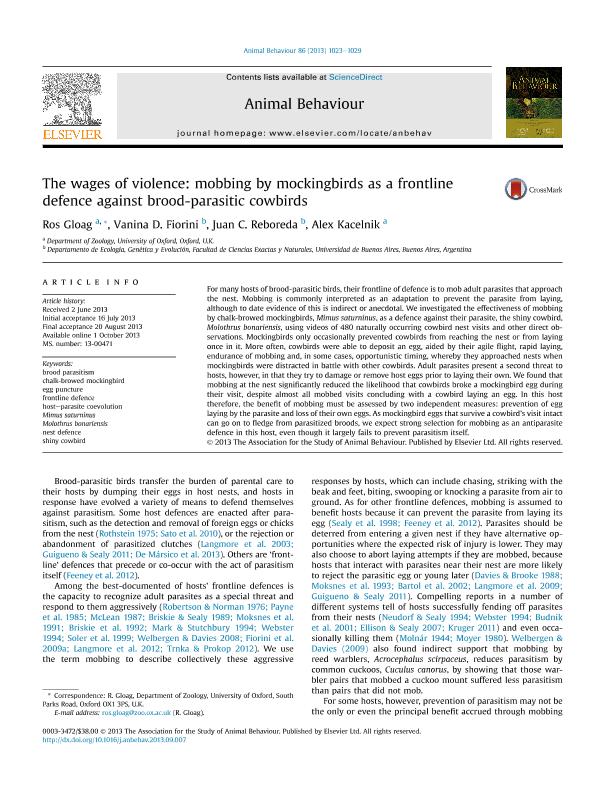Mostrar el registro sencillo del ítem
dc.contributor.author
Gloag, Ros
dc.contributor.author
Fiorini, Vanina Dafne

dc.contributor.author
Reboreda, Juan Carlos

dc.contributor.author
Kacelnik, Alex

dc.date.available
2017-07-05T17:53:34Z
dc.date.issued
2013-11
dc.identifier.citation
Gloag, Ros; Fiorini, Vanina Dafne; Reboreda, Juan Carlos; Kacelnik, Alex; The wages of violence: mobbing by mockingbirds as a frontline defence against brood-parasitic cowbirds; Elsevier; Animal Behaviour; 86; 5; 11-2013; 1023-1029
dc.identifier.issn
0003-3472
dc.identifier.uri
http://hdl.handle.net/11336/19609
dc.description.abstract
For many hosts of brood-parasitic birds, their frontline of defence is to mob adult parasites that approach the nest. Mobbing is commonly interpreted as an adaptation to prevent the parasite from laying, although to date evidence of this is indirect or anecdotal. We investigated the effectiveness of mobbing by chalk-browed mockingbirds, Mimus saturninus, as a defence against their parasite, the shiny cowbird, Molothrus bonariensis, using videos of 480 naturally occurring cowbird nest visits and other direct observations. Mockingbirds only occasionally prevented cowbirds from reaching the nest or from laying once in it. More often, cowbirds were able to deposit an egg, aided by their agile flight, rapid laying, endurance of mobbing and, in some cases, opportunistic timing, whereby they approached nests when mockingbirds were distracted in battle with other cowbirds. Adult parasites present a second threat to hosts, however, in that they try to damage or remove host eggs prior to laying their own. We found that mobbing at the nest significantly reduced the likelihood that cowbirds broke a mockingbird egg during their visit, despite almost all mobbed visits concluding with a cowbird laying an egg. In this host therefore, the benefit of mobbing must be assessed by two independent measures: prevention of egg laying by the parasite and loss of their own eggs. As mockingbird eggs that survive a cowbird's visit intact can go on to fledge from parasitized broods, we expect strong selection for mobbing as an antiparasite defence in this host, even though it largely fails to prevent parasitism itself.
dc.format
application/pdf
dc.language.iso
eng
dc.publisher
Elsevier

dc.rights
info:eu-repo/semantics/openAccess
dc.rights.uri
https://creativecommons.org/licenses/by-nc-nd/2.5/ar/
dc.subject
Brood Parasitism
dc.subject
Chalk-Browed Mockingbird
dc.subject
Egg-Puncture
dc.subject
Front-Line Defence
dc.subject.classification
Zoología, Ornitología, Entomología, Etología

dc.subject.classification
Ciencias Biológicas

dc.subject.classification
CIENCIAS NATURALES Y EXACTAS

dc.title
The wages of violence: mobbing by mockingbirds as a frontline defence against brood-parasitic cowbirds
dc.type
info:eu-repo/semantics/article
dc.type
info:ar-repo/semantics/artículo
dc.type
info:eu-repo/semantics/publishedVersion
dc.date.updated
2017-07-05T15:01:31Z
dc.journal.volume
86
dc.journal.number
5
dc.journal.pagination
1023-1029
dc.journal.pais
Países Bajos

dc.journal.ciudad
Amsterdam
dc.description.fil
Fil: Gloag, Ros. University of Oxford; Reino Unido
dc.description.fil
Fil: Fiorini, Vanina Dafne. Consejo Nacional de Investigaciones Científicas y Técnicas. Oficina de Coordinación Administrativa Ciudad Universitaria. Instituto de Ecología, Genética y Evolución de Buenos Aires. Universidad de Buenos Aires. Facultad de Ciencias Exactas y Naturales. Instituto de Ecología, Genética y Evolución de Buenos Aires; Argentina
dc.description.fil
Fil: Reboreda, Juan Carlos. Consejo Nacional de Investigaciones Científicas y Técnicas. Oficina de Coordinación Administrativa Ciudad Universitaria. Instituto de Ecología, Genética y Evolución de Buenos Aires. Universidad de Buenos Aires. Facultad de Ciencias Exactas y Naturales. Instituto de Ecología, Genética y Evolución de Buenos Aires; Argentina
dc.description.fil
Fil: Kacelnik, Alex. University of Oxford; Reino Unido
dc.journal.title
Animal Behaviour

dc.relation.alternativeid
info:eu-repo/semantics/altIdentifier/doi/http://dx.doi.org/10.1016/j.anbehav.2013.09.007
dc.relation.alternativeid
info:eu-repo/semantics/altIdentifier/url/http://www.sciencedirect.com/science/article/pii/S0003347213004077
Archivos asociados
